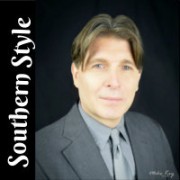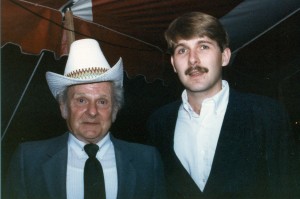An American Legend and the Opry – Violet Hensley

Violet Hensley on stage at the Grand Ole Opry on Aug. 6. (Photo by Marcia Campbell/http://www.facebook.com/marciacampbellradio)
There are moments which bring people together. Common experiences such as championship wins of athletes or sporting teams, pivotal events which shape our nation or world, or iconic performances or awards highlighting those who inspire us through performance.
I was honored to be among just such a group on Aug. 6, 2016. I traveled to Nashville to see a legendary folk fiddle performer and maker Violet Hensley. I spent a couple years of my life helping Violet bring together her life story for the book “Whittlin’ and Fiddlin’ My Own Way: The Violet Hensley Story.”
God Lord willing, Violet will mark her centennial as she celebrates her 50th year as Silver Dollar City’s longest serving spokesperson and folk artisan at a special event on Oct. 21 in Branson, Mo.
She has entertained countless millions both live and on television through appearances on American standards such as “The Beverly Hillbillies,” “Captain Kangaroo,” “To Tell the Truth,” “Regis and Kathie Lee” and countless other shows through decades of performing.
One performance dream which she had yet to realize was an appearance on the Grand Ole Opry. The show came on the air when she was 9 years old and was initially heard on a battery-powered radio in the rural Arkansas farm area of Alamo where she grew up. Now known as the Whittlin’ Fiddler from Yellville, it was another Arkansas fiddler named Tim Crouch who read of her dream in her autobiography and called Grand Ole Opry star Mike Snider. Snider then arranged for her to guest on his portion of the Grand Ole Opry.
The hit making country group Shenandoah had just left the stage as a place was prepared for her and though now her sight is limited by macular degeneration, her daughter walked her to the stool that stage hands had placed center stage near where all the country legends have performed.
As the Opry announcer passed the show back to Snider, the excitement was already building. He began an introduction, and barely got out his first few words out: “I’ve had the privilege to introduce a lot of great people on the Grand Ole Opry but it’s rare I get to introduce a National Treasure and I have one sitting hear beside me. This little lady was born in 1916…”
When the audience responded with a standing ovation that filled the Grand Ole Opry House. A wave of sound flooded the stage as the centenarian’s face beamed, as did that of her daughter Sandra and grandson Sterling who joined her musically on stage with Snider’s band. That moment broadcast across the world on wsmonline.com and on the same airways that she listened to as a girl with her fiddle playing father brought people lining the stage to tears.
She is one of America’s first nationally known female fiddlers and fiddle makers. She inspired generations of girls and boys on every imaginable children’s show from coast to coast to know they could play American music and even learn to build a fiddle if they desired. Someone who became the image of one of America’s most iconic theme parks and thus a part of the fabric of America itself.
Much like Dolly Parton is to Dollywood and Mickey Mouse is for Disney – Violet Hensley’s smile, laughter, wit and uplifting spirit, helped shape the family memories and experiences that fueled rhe Midwestern American culture. On this night America was giving something back to her – love for a century of entertaining, teaching, and encouraging, while all the struggles and hardships that went along with it.
Among the audience in the Opry house and listening were many of her descendants, but in a way, all of us whom she had touched through radio, TV and in person were her musical descendants. Had this occurred just a few years earlier, she probably would have placed the fiddle on top of her head and while she fiddled and sang “She’ll Be Comin’ ‘Round the Mountain,: she would have danced a little jig, but tonight she selected the fiddle tune “Angeline the Baker” and seriously applied her expertise to make her Ozark forebearers proud.
She accomplished that goal and more. I think all that were touched by the moment will always remember it. Though now the focus of our attention is split between hundreds of media sources, unlike in the days when there were just a handful of clear channel radio stations like WSM or two or three local TV stations. In those days, you knew what everyone would be talking about the next morning.
This was one of those moments to talk about. If you missed it, maybe you can at least learn more about this amazing American Legend by visiting VioletHensley.com or liking “Whittlin’ and Fiddlin’ My Own Way” on Facebook. There is much to learn about life from someone who lived 100 years, raising a large family while living as a farmer, migrant farm worker, and keeping the tradition of Ozark music thriving.




